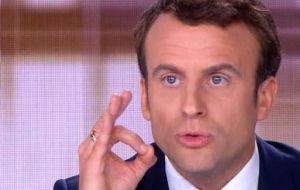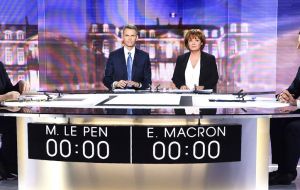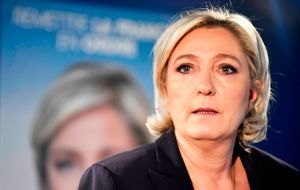MercoPress. South Atlantic News Agency
French presidential candidates' debate: plenty of insults and no substance
 Le Pen vowed to “eradicate the ideology of radical fundamentalism” by closing France’s borders and expelling those on its terrorism watch list
Le Pen vowed to “eradicate the ideology of radical fundamentalism” by closing France’s borders and expelling those on its terrorism watch list  Macron called for improving cyber-intelligence and urged better European coordination, arguing that shuttering the country’s borders alone would not help.
Macron called for improving cyber-intelligence and urged better European coordination, arguing that shuttering the country’s borders alone would not help.  Macron, citing Middle East scholar Gilles Kepel, warned that Le Pen was playing into the hands of jihadists who want France to delve into civil war.
Macron, citing Middle East scholar Gilles Kepel, warned that Le Pen was playing into the hands of jihadists who want France to delve into civil war.  Le Pen vowed to put France’s EU membership on referendum, and regardless of who won the election, France would certainly be governed by a woman
Le Pen vowed to put France’s EU membership on referendum, and regardless of who won the election, France would certainly be governed by a woman Independent Emmanuel Macron and far-right leader Marine Le Pen traded barbs and insults Wednesday night in their first and final head-to-head debate ahead of Sunday’s presidential runoff.
More than two hours long, the debate ultimately ended the way it began: With Le Pen equating her opponent to deeply unpopular Socialist President François Hollande, while Macron characterizing her as an extremist without a plan.
Seated opposite each other at a long table with two moderators in between, the candidates clashed over issues that have long remained at the forefront of the presidential contest: the economy, security, and France’s place in the European Union.
While Le Pen railed on her opponent as a “candidate of savage globalization” who would worsen France’s economy, Macron accused Le Pen of attacking his platform without having a plan of her own, casting her candidacy as one “that has prospered for years and years on the back of French people’s anger,” in an apparent reference to her father, Jean-Marie Le Pen, the National Front (FN) founder. Like his daughter, the elder Le Pen also advanced to the second round of a French presidential election in 2002, though he lost to incumbent President Jacques Chirac in a landslide.
Wednesday’s debate marked the first time a presidential runoff candidate agreed to debate a far-right opponent. Chirac in 2002 refused to debate Le Pen, noting at the time that “faced with intolerance and hatred, no debate is possible.”
The candidates leveled some of their sharpest exchanges while debating security and terrorism, a topic that has remained at the forefront of the country’s election following many deadly terrorist attacks that have resulted in the deaths of more than 200 people since 2015.
While Le Pen vowed to “eradicate the ideology of radical fundamentalism” by closing France’s borders and expelling those on its terrorism watch list, Macron called for improving the country’s cyber-intelligence and urged better European coordination, arguing that shuttering the country’s borders alone would not help.
Le Pen accused Macron of being “obedient to Islamist fundamentalists.” Macron, citing Middle East scholar Gilles Kepel, warned that Le Pen was playing into the hands of jihadists who want France to delve into civil war.
When asked about the European Union, Macron reaffirmed his pro-Europe stance, but added its institutions needed reform. Le Pen vowed to put France’s membership in the EU on referendum, adding that regardless of who won the election, France would certainly be governed by a woman—“either me or Mrs. [Angela] Merkel,” referencing the German chancellor.
The candidates also traded blows over each other’s campaign blunders. Le Pen accused Macron of insulting the French people when he called the country’s colonization of Algeria a “crime against humanity.” Macron countered by criticizing Le Pen’s remarks denying France’s role in the roundup of French Jews during World War II—an act she blamed on the Vichy government, which she argued was illegitimate.
In closing, Macron derided Le Pen’s campaign as one of “fear and lies,” adding he will “refuse the spirit of defeatism and hatred which is that of the National Front.” Le Pen got the last word of the night by once again referencing the unpopular Socialist president: “Hollande’s project.”
An Elabe poll immediately following the debate found that Macron had the stronger performance of the night, with 63% of viewers considering him more convincing; 34% thought Le Pen performed better.
The reaction mirrors what pollsters project to be the final outcome when voters head to the polls for the Sunday runoff—recent polls project Macron will beat Le Pen comfortably with 60% of the vote. Turnout, however, could affect the outcome. Some voters remain undecided, and recent polls project the abstention rate could stand as high as 26%, markedly higher than the 19.6% of voters who abstained in 2012




Top Comments
Disclaimer & comment rulesCommenting for this story is now closed.
If you have a Facebook account, become a fan and comment on our Facebook Page!